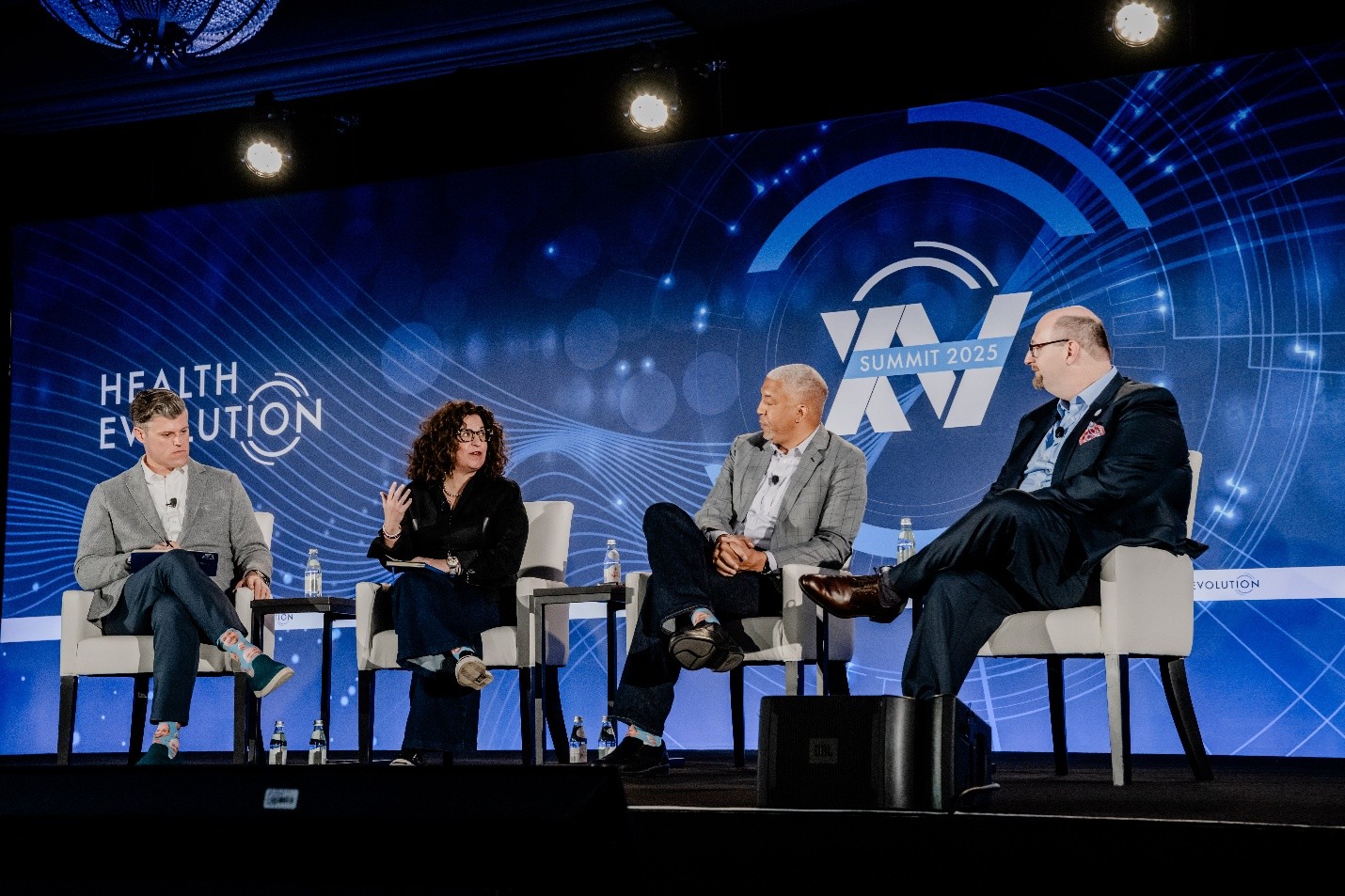Recent waves of negative public sentiment reveal deep-seated distrust and frustration with health care writ large. Recognizing we can no longer continue business as usual, health care executives are grappling with how to truly understand, internalize, and address the public’s pain points with the industry and what it delivers.
During our 2025 Summit, executives from across the industry gathered together across three special breakout discussions for Health Evolution Fellows to begin exploring—in Health Evolution Forum’s authentic, honest, and closed-door setting—meaningful solutions to the problems driving widespread public discontent.
Executives joined these highly interactive sessions led by some of the incredible leaders in Health Evolution’s Fellowship community:
- Amy Abernethy, MD, PhD, Co-founder, Highlander Health; Former Principal Deputy Commissioner, FDA
- Shamiram Feinglass, MD, MPH, Managing Director, Manatt Health Strategies
- Mark Ganz, Founder & Principal, Lion Creek Partners; former CEO, Cambia Health Solutions
- Kody Kinsley, Senior Advisor, Milken Institute; former North Carolina HHS Secretary
- Rob Lazerow, EVP, Health Evolution
- Elizabeth Mitchell, President & CEO, Purchaser Business Group on Health
- Kathleen Noonan, President & CEO, Camden Coalition of Healthcare Providers
- Edmondo Robinson, MD, MBA, MS, Founder and CEO, Downeast Digital
To continue the conversation, Lazerow later led a Big Discussion debrief with Kinsley, Feinglass, and Robinson, distilling insights from the Fellowship Breakout discussions and gathering perspectives from all Summit participants. Across the conversations, executives shared how they’re thinking about the challenges facing the industry—and how they are moving toward meaningful transformation.
Understanding public sentiment toward the health care industry
Leaders highlighted three key themes they’ve heard while working to understand public sentiment:
1. Everyone is frustrated.
While consumer pain points are a top-of-mind issue in today’s environment, frustration with the health care system extends beyond consumers. Executives noted that they, too, are navigating frustrations and pain points throughout the industry.
“All of us in health care, everyone is frustrated—we’re frustrated with each other, we’re frustrated with the system, and we’re frustrated with the processes,” Robinson said.
Leaders acknowledged an underlying current of cynicism—both “from those who are using health care and administering it,” Lazerow said. However, Feinglass noted that despite executives’ acknowledgement of the mounting challenges, “leaders were also optimistic” that there are opportunities and momentum for organizations across the health care ecosystem to come together and drive meaningful change.
2. Trust must be a priority.
Fostering trust—both with the public and between industry stakeholders—is essential to making progress.
To move forward, health care leaders must take a hard look at how leadership practices, organizational culture, and industry dynamics may be contributing to mistrust. They must commit to installing collaboration, transparency, and consistency across the system to rebuild trust with consumers and across organizations in the health care ecosystem.
“We need to stop asking ‘why don’t people trust us?’ And start asking ‘why aren’t we more trustworthy?’” Lazerow said, reiterating dialogue started at Health Evolution Connect.
3. Consumers need solutions now.
Leaders acknowledged the health care system is overwhelmingly complex. “People find the system to be far too confusing and really want simplification,” Feinglass said.
While leaders throughout the industry agree on the need for transformation, they’re often divided on specific solutions. That debate stalls progress, even as the pressure to act intensifies.
However, discussion leaders said executives can no longer wait for perfect solutions; they must act now. “There is not time to think about this later, we need to do something about this now,” Robinson said.
Leaders made it clear the industry needs bold, large-scale solutions fast.
Meeting ‘Our Leadership Moment’ through meaningful transformation
This moment calls for collaboration, deep introspection, and a renewed sense of accountability. Health care leaders must identify and act on bold solutions that will drive meaningful transformation, while shedding legacy behaviors that no longer serve the needs of patients, providers, or communities. To truly drive meaningful transformation and address pain points, executives said the industry must:
1. Champion introspection and accountability.
Leaders have a significant opportunity to foster a culture of introspection and accountability—both within their own organizations and across the health care industry.
“Perception is reality,” Kinsley said. “In this moment in the public sentiment, we have to look hard in the mirror and understand that no matter how hard we try and no matter how many good things we do, if the broad public sentiment continues to drop, that’s the reality.”
To overcome negative public sentiment, industry leaders must acknowledge their roles in creating consumer pain points and take accountability for addressing them. Further, they should work to cultivate an environment where trust and empathy are not just encouraged but expected.
Leaders must take deliberate action to rebuild and maintain trust, and ensure they are “being very intentional about developing, measuring, and rewarding trust,” Robinson said.
“We can do just a little bit more to help each other and to push empathy forward,” Kinsley said, adding, “I think that is a call to leadership in this moment.”
2. Align on pragmatic solutions.
To identify and advance solutions, leaders must cut through complexity and align on pragmatic, transparent, and value-driven transformation. However, because there is so much debate over the path forward, determining where to start is a significant challenge. “Do we move within the space we have, or do we flip the table?” Kinsley asked.
Leaders said true transformation hinges on solutions aimed at improving both payment and care delivery models while incentivizing value and outcomes, and Robinson noted that leaders are eager to take a fresh look at incentives and processes within the health care system to do so. “Let’s value map all the processes from start to finish, figure out where value accrues, and then redistribute that value in ways that actually make sense,” Robinson suggested.
“The idea is if you change the system, you change those incentives, you change the training, you reward the things that matter,” Feinglass said.
3. Find opportunities to collaborate.
But making significant, impactful change cannot be accomplished in siloes. Health care leaders are facing structural, systemic issues that must be met with cross-industry partnerships and collective action, leaders said. Stakeholders across the industry will need to let go of entrenched positions, partner on shared goals, and engage government to implement actionable, long-term solutions that drive meaningful progress.
“I think that in order to drive trust in the system, there are going to be things that have to move,” Feinglass said. And for the first time, “people are truly ready to give something up and move it to someone else,” she added.
Ultimately, “we’re in this together, so we need to fix this together,” Lazerow concluded.
Continuing the conversation: Join your peers in upcoming sessions to advance this work
Health Evolution is committed to supporting health care leaders as we work to rebuild public trust in the industry and create a health care ecosystem that centers on providing accessible, affordable, consumer-centered care and experiences. We invite executives from across the health care industry to join their peers as we continue these conversations at upcoming convenings:
July 16 Virtual Forum-Wide Special Session – Continuing the Conversation: Our Leadership Moment
Building on the Fellowship Breakout discussions and main stage debrief at 2025 Summit, Health Evolution Fellows will continue this pivotal conversation in a Forum-wide special session on July 16. In this highly interactive, Fellow-driven working session—modeled after our Confab Get Real Breakouts to create an authentic, honest, and closed-door setting—leaders will confront the multitude of actions that erode trust in health care. Together, Fellows will explore the root causes of public sentiments, pinpoint actionable opportunities to rebuild trust, and help set our community’s agenda for the year ahead. Register to attend here.
Sept. 7-10 – 2025 Connect in Nashville
We look forward to further supporting the Health Evolution Community in addressing these challenges with more opportunities to collaborate and drive progress during our in-person 2025 Connect gathering in Nashville, Sept. 7-10. Apply to attend Connect here and join your peers in leading meaningful transformation.











